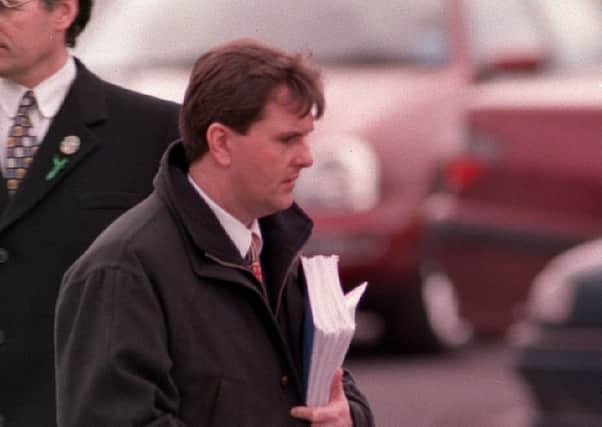1998 deal: Jeffrey Donaldson '“ '˜Prisoner release was not linked to decommissioning'


It was the day in September 1997 that Sinn Fein first entered the talks process at Stormont.
The PIRA had called a second ceasefire, just a few weeks after I had been elected for the first time as Member of Parliament for Lagan Valley.
That day was a time of mixed emotions for me.


Advertisement
Hide AdAdvertisement
Hide AdI realised that we had to try and find a way out of the mire that had seen Northern Ireland stuck in an endless cycle of violence for 30 years. Yet, as I looked across the room at the faces of the Sinn Fein leadership, I realised I was looking at the people who had directed the murder of family and friends as well as comrades with whom I had served in the Ulster Defence Regiment.
Would they be willing to give up their violence for good and admit that violence for political purposes is wrong?
Would they lay down their weapons of murder and destruction?
These were the questions foremost in my mind.


The culmination of that talks process is the Belfast Agreement, entered into on Good Friday 1998, endorsed by a majority of the political parties and supported by over 70% of the voting population.
Advertisement
Hide AdAdvertisement
Hide AdI voted against the agreement because I believed it to be fundamentally flawed.
Firstly, it contained no commitment by the IRA or any other paramilitary terrorist group to lay down their weapons.
It merely committed the political parties to use their best efforts to persuade them to do so.
Secondly, the agreement held out the prospect of a Sinn Fein Party still linked to a fully armed IRA being part of the government of Northern Ireland.
Advertisement
Hide AdAdvertisement
Hide AdThirdly, the agreement facilitated the early release of terrorist prisoners over a two year period and created no effective linkage between this and the decommissioning of weapons by the terrorist organisations they belonged to.
This was devastating for the innocent victims of terrorism and meant that men and women with convictions for multiple murders would be released early without a single rusty bullet being decommissioned by the main terror groups.
Fourthly, the agreement created an Independent Commission on policing that I knew would ultimately lead to the demise of the Royal Ulster Constabulary, the brave men and women who had helped hold the line in the face of a most vicious assault on democracy and the entire community in Northern Ireland.
They deserved better than this. As a result of the flaws in the agreement, its implementation was fraught with difficulty and the process has stumbled forward, with regular suspension of the political institutions created under the accord.
Advertisement
Hide AdAdvertisement
Hide AdIt wasn’t until the St Andrew’s Agreement in 2006 and Stormont House Agreement in 2014 that we were able fix some of those flaws and finally enjoy a period of prolonged political stability.
A key lesson for all interested in peace-building is that constructive ambiguity may be your friend as a short-term expedient to get an agreement but it quickly becomes your enemy when it comes to the implementation phase.
The collapse of the institutions following the withdrawal of Sinn Fein from the executive at the beginning of 2017 demonstrates just how fragile the entire process is and that we have a long way to travel on our journey to lasting peace and reconciliation.
We are still trying to repair the flawed parts of the agreement and reform of the political institutions remains a key element of the negotiations to restore devolution.
Advertisement
Hide AdAdvertisement
Hide AdWe do need to see the political institutions restored, although this must be on a sustainable basis.
The people of Northern Ireland deserve better and government here should not be left vulnerable to the whim of those who run away from tough decisions or who feel there is some electoral gain to be made from collapsing the assembly and executive.
In an interview to mark the 20th anniversary of the agreement, Gerry Adams has said that violence is still a legitimate way to achieve aims.
Such a statement must be a massive boost to so-called dissident republicans as they seek to recruit more young people into their ranks.
Advertisement
Hide AdAdvertisement
Hide AdAt a time of political vacuum created by the abdication of the Sinn Fein leadership, such talk is dangerous and proves that two decades on from that fateful first meeting with Gerry Adams, we are still waiting for Sinn Fein to do the right thing and turn their back on violence for good.
The republican leadership may have decommissioned their weapons but they have not yet decommissioned the harmful mind-sets that justify violence as being legitimate.
Twenty years on from the signing of the Belfast Agreement much has changed for the better in Northern Ireland but the question arises, with such attitudes amongst the leadership of the republican movement, are we any closer to the reconciliation that the agreement heralded?
That is why we need an effective process to deal with the legacy of our troubled past, another glaring omission from the Belfast Agreement.
Advertisement
Hide AdAdvertisement
Hide AdWe owe it to the innocent victims to help them in their quest for truth and justice so that collectively we can begin to heal the wounds that still run deep across our entire community.
History will judge whether the 10th April 1998 marked a real turning point for Northern Ireland.
Despite my concerns about the Belfast Agreement and the time it has taken to fix its flaws, I remain optimistic for the future.
I grew up in the shadow of the Mourne Mountains and am often reminded that however high the challenge in front of us, it is no higher than the ones we have already conquered.
• Sir Jeffrey Donaldson is DUP MP for Lagan Valley